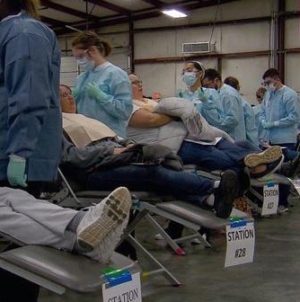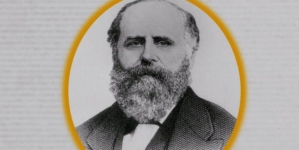-
UEFA Nations League Final: Spain-Portugal is more than just Ronaldo vs. Yamal - 10 mins ago
-
Senior Dog’s Microchip Leads Shelter to Owner, But a Cruel Twist Awaits - 33 mins ago
-
A mournful Eid al-Adha in Gaza - 35 mins ago
-
A 9-year-old girl died after a dental surgery. Now we know why - 43 mins ago
-
Birmingham Stallions’ Skip Holtz, J’Mar Smith reunite with chance to make history - 55 mins ago
-
MIT’s E-BAR robot helps prevent falls as US senior population grows rapidly - about 1 hour ago
-
I Run a Legal Brothel—Here’s What It’s Taught Me About People’s Fantasies - about 1 hour ago
-
Just how much damage did Ukraine do in its ‘Spiderweb’ drone attack on Russia? - about 1 hour ago
-
Texas Tech pitcher NiJaree Canady signs second $1M-plus NIL deal - 2 hours ago
-
SEIU California President David Huerta Arrested in ICE Raids - 2 hours ago
Small businesses say they’re pulling back on hiring amid tariff uncertainty
Some small business owners say they are pulling back on hiring as tariff-driven cost increases make bringing on new employees an untenable proposition.
As they bear added expenses on imported inputs and goods, companies are looking to trim costs wherever else they can — including on labor. That can mean pressing pause on hiring, cutting workers’ hours, and even laying off staff, business owners say. Smaller enterprises lead bigger corporations in reducing head counts, as they typically have less financial cushion to tide them over during periods of economic uncertainty.
Mike Roach, owner of Paloma Clothing, a men’s and women’s boutique in Portland, Oregon, told CBS MoneyWatch that while he has not yet laid off any salespeople, he is cutting down on labor-related spending.
“We are not hiring and [are] trying to shave anyone’s hours who is willing and able,” he told CBS MoneyWatch.
Roach says he is looking for ways to save in order to make up for a 22% decrease in profit for the month of May, compared with the same period one year earlier. He attributes the drop in earnings to weaker consumer demand amid rising prices and general economic uncertainty.
“I am tired of breaking even”
Shayai Lucero is the owner of Earth & Sky Floral Designs, a one-woman floral shop in Albuquerque, New Mexico. She said she had hoped to bring on another worker this summer to help alleviate her heavy workload, but tariffs have caused her to rethink her hiring agenda.
“I was looking at hiring somebody to handle the more minor tasks of the business, so I could streamline my own goals better,” she told CBS MoneyWatch. “But I am in a place where I can’t even afford to hire one person.”
Lucero said tariffs have driven up wholesale flower prices so drastically that she has been forced to charge her customers more and can’t fathom increasing prices any further. “My clientele can’t afford for me to keep increasing prices, and I am tired of breaking even,” she said.
Drop in hiring
The share of small business owners planning to create new jobs over the next three months fell to 12% in May, from 13% in April, data from the National Federation of Independent Businesses (NFIB) May jobs report shows.
“Amid uncertainty, small business owners’ hiring plans remain subdued in May,” Bill Dunkelberg, chief economist at NFIB, said in a statement. “Compensation pressures have also eased, offering some much needed relief for many owners.”
Labor costs, the top concern of business owners according to the NFIB report, rose one point in May, to 9%.
Experts say the moderation in hiring makes sense given the current economic environment.
“Bottom line, should we really be surprised by the slowing hiring pace in light of all the macro challenges we keep hearing about and not helped by the tariff costs, confusion and volatility with its uses?” Peter Boockvar chief investment officer of Bleakley Financial Group, wrote in a blog post. “Just put yourself in the shoes of an employer and we can understand the hesitancy that so many business people have, especially small businesses that just don’t have the flexibility that larger companies have to adjust, nor the finances.”
NFIB Executive Director Holly Wade said a number of small business owners are foregoing filling open positions given their heightened sensitivity to labor costs.
“Keeping them on payroll is a significant part of expenses, and their margins are a lot more sensitive to that than their larger counterparts,” she told CBS MoneyWatch. “They are certainly looking to try to absorb those higher costs any way they can, and one way is on the labor front.”
Not only are many of the nation’s small enterprises scrapping plans to grow their labor forces, they’re also shedding jobs, data released this week from payroll processor ADP shows.
Establishments with fewer than 50 employees lost 13,000 jobs in May, according to a report released Thursday by ADP’s National Employment, an independent measure of employment changes at private companies.
No certainty, no hires
Ken Giddon, owner of Rothman’s, a men’s clothing store with three locations across New York, said a lot of company plans and initiatives have “been put on hold,” as tariffs wipe away optimism among business owners like himself.
At Rothman’s, that means foregoing adding two workers to the company’s staff of roughly 30 people. “We probably would have added a person or two this year, and now we are not. Tariffs threw a whole wrench in the thing. They took away the optimism, they took away the certainty,” he told CBS MoneyWatch.
Nikki Bravo, owner of Momentum Coffee, a small chain of coffee shops in Chicago said she’s also hesitating to bring on new workers. Bravo employs 12 people across five locations, a number that usually swells to more than 20 in the summertime, she said. In addition to hiring seasoned workers, Bravo typically likes to give opportunities to people who have trouble finding employment, either because they’re inexperienced, or for other reasons. She’s had to pull back on that initiative too, though.
“When you have economic uncertainty, we need to have more certainty in our hires,” she told CBS MoneyWatch. “So I have to select people with more experience. I can’t take risks on unproven folks and that’s unfortunate, because part of our mission is to give back and work with the community.”
This year, Bravo plans to hire about eight additional workers to accommodate summer crowds, whereas in years past, she would’ve brought on up to 13. But that is simply unaffordable right now, she said, given how high her other costs, including on coffee and packaging materials, have risen.
“It’s coffee, so we can’t keep putting that off to the customer, because they’re only going to spend so much,” Bravo told CBS MoneyWatch. “So we have to look at other ways to reduce our costs and keep them steady.”
Source link






























